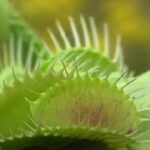As an Amazon Associate, this site earns commissions from qualifying purchases. For more details, click here.
We know that sundews are carnivorous plants, so they eat insects and any prey that falls into their trap. But what other types of meat can they eat? Can you feed hamburgers to sundews for instance? Knowing what these carnivorous plants can and cannot digest is essential for any would-be grower. To feed them properly you nave to know what types of meat the plant can and cannot eat.
Sundews are carnivorous plants that eat insects and worms for nutrition. But they cannot digest hamburger or other meat meant for human consumption.
What Meat Can Sundews Eat?
Meat is any animal flesh which is consumed as food. Under this definition, sundews do eat meat, but there are exceptions.
Sundews eat worms, flies, mosquitoes, spiders and other small insects. They can eat any animal flesh that is small enough to digest. However, they cannot eat processed meat or those prepared for human consumption.
Aside from insects and worms, sundews can also eat freeze dried mealworms. Fish flakes and pellets, while not meat, are also good for sundews. We recommend Kaytee Koi’s Choice Floating Fish Food as it contains the nutrients sundews need to grow.
Sundews grow in bogs, fens and other watery locations in the wild. They thrive in high humidity with plenty of sunlight. Insects abound in these locations so it is no surprise these became part of the sundew diet.
Their dew works like flypaper and is an effective way to catch prey. The digestive process can take a week or longer. Only one tentacle at a time has to feed and overfeeding the plant could affect its health.
How will you know if your sundew is getting enough meat to eat? Assume that it takes one week for the plant to digest an insect. That means one tentacle must always be closed. That also means the sundew is eating four times a month.
If your sundew is outdoors it can fend for itself. Just leave the plant with enough light and water and it will have no problems catching insects. For indoors sundews, feed it once a week for optimum growth.
These insects contain nitrogen, which plants need for various reasons. Sundews do not care if the insect is alive or dead. If it falls into the dew, its tentacles will trap the bug and eat it.
Mixing and matching these foods is not going to hurt these plants. So yes sundews do consume meat like other carnivores, but not processed food.
Why Sundews Cannot Eat Hamburger
If sundews can eat the flesh of insects, why can they not eat hamburger? After all hamburger, steak, barbecue are also meat right?
Sundews cannot eat meat for human consumption for two reasons. They are too rich in protein and second, their digestion cannot handle it.
Sundews eat different kinds of animal meat, but all of them are raw. They have not been processed or altered in any way. Sundews can digest these creatures because they are its natural prey.
Mosquitoes, flies, gnats, etc. abound in the natural habitat of these plants. Their dew and digestive enzymes have developed and evolved specifically to absorb the nutrients in these animals.
Hamburgers, beef and other meats undergo processing so humans can eat them. This makes the meat fit for people but not plants. If you drop a piece of hamburger onto a sundew, one of two things will happen.
One, the sundew does not eat it. The tentacle might close over the food (how long this will take depends on the species) but eventually it will reopen, the meat untouched. Or the sundew somehow manages to eat the hamburger and gets sick.
Even if sundews were capable of eating processed meat it will not do them any good. Steaks, barbecue and cheeseburgers have too much protein. This could cause serious damage to the plant in the long term.
Sundew enzymes are also meant for mostly insects. There is no telling what processed meat will do to the plant in case it is ingested.
Feeding hamburger to sundews should be avoided period. It might seem like a fun and harmless experiment. But this could have serious ramifications for the sundew. If you want to add some variety to their diet, give your sundew some Sera Catfish Chips instead.
Why are Sundew Plants Carnivores?
Sundew plants grow in poor soil so they have to get nutrition through eating animals. Insects are rich in nitrogen and other elements which sundews require.
The sundew is a good example of how life forms evolve in order to survive. Light and water enables these carnivorous plants to produce dew (or mucilage) to catch insects. Without nutrients, sundews weaken and become prone to aphid infestation.
Sundews, Venus flytraps and other carnivorous plants developed traps to stay alive. Regular plants cannot survive in poor soil. The ground must be fertilized for houseplants to survive. The soil nutrients make their way into the rest of the plant.
With sundews it is different. First a sundew has to lure a potential prey. It can be any small worm for instance. The dew on their tentacles secrete a sweet smell that attracts these animals, making them the perfect lure.
Once a prey is caught in the dew, the tentacles draw it into the leaves to be consumed. Enzymes soften the tissues until it is almost liquid, allowing the plant to absorb it. The tissues, nutrients etc. are absorbed in the plant.
These nutrients strengthen their immune system and provide additional energy. A well fed sundew produces more dew, has more vibrant colors and faster response time to catching prey.
If sundews did not become carnivorous, they will weaken. The only reason carnivorous plants thrive in poor soil is by eating insects.
Can sundews live without these nutrients? It is possible, but the plant will be a vulnerable condition. Sundews should eat once a week, but older species will live feeding only every two weeks. But they will not be as healthy compared to those that eat meat on a weekly basis. So yes, meat is very good for sundews.
Tips For Feeding Sundews
We want our sundews to grow fast and feeding is essential for this .However, the plant has to be fed the proper way.
- Decide whether to place your sundew indoors or outdoors. This will determine whether you have to feed it or not.
- If the plant is outside then there should be plenty of food available for it. If the sundew is indoors, you have to give it food. Unless your windows and doors are always open, the plant will not be able to catch enough prey.
- Live and dead insects do not make a difference. So it is more practical to buy freeze dried crickets or mealworms than catch and kill insects. Of course your sundew might draw a few flies, mosquitoes or other insects on occasion.
- Do not overfeed your sundew. Be patient as some drosera species take more than a week to digest prey. As long as the plant is eating and has lots of dew, there is nothing to worry about.
- If your sundew refuses to eat, observe the plant. Is there dew on its tentacles? If not, the plant needs more light. Is the plant losing its red color and turning all green? This is also a sign of lack of light. Or it could simply be a case of the sundew is already full.
- Feeding sundews is easy. Just put food on its dew and the tentacle will take over. But make sure none of the food spills over to the soil. Remember these foods contain nitrogen and other nutrients and these plants only live on poor soil. Too many food bits could enrich the soil and affect the growth of these plants. Spray water onto the soil if some food gets spilled.
Conclusion
Sundews are among the easiest carnivorous plants to feed and will try to eat any prey it can trap. That being said, you should avoid feeding it meat meant for humans and your drosera will be fine.

My fascination with carnivorous plants began many, many years ago with Venus Fly Traps. Now I am more than happy to impart what I know with other enthusiasts and those who are curious about meat eating plants.



